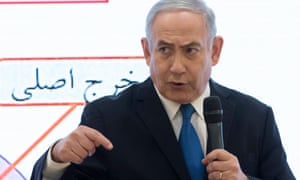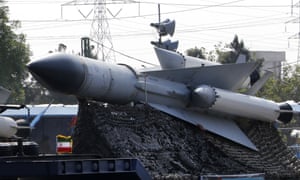The Observer
Link
Aides to Donald Trump, the US president, hired an Israeli private intelligence agency to orchestrate a “dirty ops” campaign against key individuals from the Obama administration who helped negotiate the Iran nuclear deal, the Observercan reveal.
People in the Trump camp contacted private investigators in May last year to “get dirt” on Ben Rhodes, who had been one of Barack Obama’s top national security advisers, and Colin Kahl, deputy assistant to Obama, as part of an elaborate attempt to discredit the deal.
The extraordinary revelations come days before Trump’s 12 May deadline to either scrap or continue to abide by the international deal limiting Iran’s nuclear programme.
Jack Straw, who as foreign secretary was involved in earlier efforts to restrict Iranian weapons, said: “These are extraordinary and appalling allegations but which also illustrate a high level of desperation by Trump and [the Israeli prime minister] Benjamin Netanyahu, not so much to discredit the deal but to undermine those around it.”
One former high-ranking British diplomat with wide experience of negotiating international peace agreements, requesting anonymity, said: “It’s bloody outrageous to do this. The whole point of negotiations is to not play dirty tricks like this.”
Sources said that officials linked to Trump’s team contacted investigators days after Trump visited Tel Aviv a year ago, his first foreign tour as US president. Trump promised Netanyahu that Iran would never have nuclear weapons and suggested that the Iranians thought they could “do what they want” since negotiating the nuclear deal in 2015. A source with details of the “dirty tricks campaign” said: “The idea was that people acting for Trump would discredit those who were pivotal in selling the deal, making it easier to pull out of it.”
According to incendiary documents seen by the Observer, investigators contracted by the private intelligence agency were told to dig into the personal lives and political careers of Rhodes, a former deputy national security adviser for strategic communications, and Kahl, a national security adviser to the former vice-president Joe Biden. Among other things they were looking at personal relationships, any involvement with Iran-friendly lobbyists, and if they had benefited personally or politically from the peace deal.
Investigators were also apparently told to contact prominent Iranian Americans as well as pro-deal journalists – from the New York Times, MSNBC television, the Atlantic, Vox website and Haaretz, the Israeli newspaper among others – who had frequent contact with Rhodes and Kahl in an attempt to establish whether they had violated any protocols by sharing sensitive intelligence. They are believed to have looked at comments made by Rhodes in a 2016 New York Times profile in which he admitted relying on inexperienced reporters to create an “echo chamber” that helped sway public opinion to secure the deal. It is also understood that the smear campaign wanted to establish if Rhodes was among those who backed a request by Susan Rice, Obama’s final national security adviser, to unmask the identities of Trump transition officials caught up in the surveillance of foreign targets.
Although sources have confirmed that contact and an initial plan of attack was provided to private investigators by representatives of Trump, it is not clear how much work was actually undertaken, for how long or what became of any material unearthed.
Neither is it known if the black ops constituted only a strand of a wider Trump-Netanyahu collaboration to undermine the deal or if investigators targeted other individuals such as John Kerry, the lead American signatory to the deal. Both Rhodes and Kahl said they had no idea of the campaign against them. Rhodes said: “I was not aware, though sadly am not surprised. I would say that digging up dirt on someone for carrying out their professional responsibilities in their positions as White House officials is a chillingly authoritarian thing to do.”
A spokesman for the White House’s national security council offered “no comment” when approached. However, the revelations are not the first time that claims of “dirty tricks” have been aimed at the Trump camp. Special counsel Robert Mueller is leading an investigation into apparent attempts by Trump’s inner-circle to dig up damaging information on Hillary Clinton during the 2016 presidential campaign.
Of particular interest is a meeting involving the US president’s eldest son, Donald Trump Jr, his brother-in-law Jared Kushner and then-campaign chair Paul Manafort and a Kremlin-connected Russian lawyer who had promised damaging information about Clinton.
Trump has repeatedly signalled his intention to scrap the Iran deal, denouncing it as “the worst deal ever.” In a January speech the US president accused his predecessor of having “curried favour with the Iranian regime in order to push through the disastrously flawed Iran nuclear deal.”
Last Monday, Netanyahu, accused Iran of continuing to hide and expand its nuclear weapons know-how after the 2015 deal, presenting what he claimed was “new and conclusive proof” of violations.
However, European powers including Britain responded by saying the Israeli prime minister’s claims reinforced the need to keep the deal.
On Thursday the UN secretary general Antonio Guterres urged Trump not to walk away from the deal, warning that there was a real risk of war if the 2015 agreement was not preserved. The following day details emerged of some unusual shadow diplomacy by Kerry, meeting a top-ranking Iranian official in New York to discuss how to preserve the deal.
It was the second time in around two months that Kerry had met foreign minister Javad Zarif to apparently strategise over rescuing a pact they spent years negotiating during the Obama administration. Straw, who was foreign secretary between 2001 and 2006, said: “The campaign against the JCPOA has been characterised by abuse and misinformation. It is the best chance of ensuring Irannever develops a nuclear weapons programme, and it is insane to suggest abandoning the deal could do anything but endanger international security.”



 US President Donald Trump shakes hands with Saudi Crown Prince Mohammed bin Salman in the Oval Office of the White House on 20 March 2018 (AFP)
US President Donald Trump shakes hands with Saudi Crown Prince Mohammed bin Salman in the Oval Office of the White House on 20 March 2018 (AFP) Palestinians from the Shuafat refugee camp in occupied East Jerusalem watch as Israeli forces repair the separation wall dividing the camp from the Israeli settlement of Pisgat Zeev on 27 April 2018 (AFP)
Palestinians from the Shuafat refugee camp in occupied East Jerusalem watch as Israeli forces repair the separation wall dividing the camp from the Israeli settlement of Pisgat Zeev on 27 April 2018 (AFP)